2018高考英语二轮备考课件16--语法填空
浙江省2018届高考英语二轮复习语法填空提升练一时态和语态(含答案)
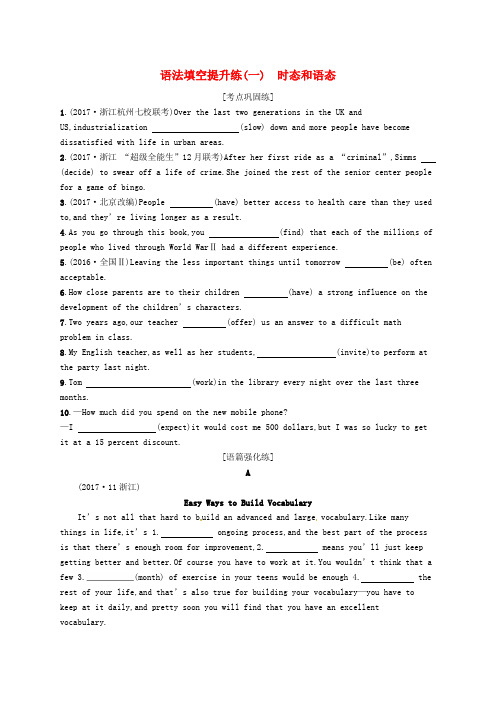
语法填空提升练(一) 时态和语态[考点巩固练]1.(2017·浙江杭州七校联考)Over the last two generations in the UK andUS,industrialization (slow) down and more people have become dissatisfied with life in urban areas.2.(2017·浙江“超级全能生”12月联考)After her first ride as a “criminal”,Simms (decide) to swear off a life of crime.She joined the rest of the senior center people for a game of bingo.3.(2017·北京改编)People (have) better access to health care than they used to,and they’re living longer as a result.4.As you go through this book,you (find) that each of the millions of people who lived through World WarⅡ had a different experience.5.(2016·全国Ⅱ)Leaving the less important things until tomorrow (be) often acceptable.6.How close parents are to their children (have) a strong influence on the development of the children’s characters.7.Two years ago,our teacher (offer) us an answer to a difficult math problem in class.8.My English teacher,as well as her students,(invite)to perform at the party last night.9.Tom (work)in the library every night over the last three months.10.—How much did you spend on the new mobile phone?—I (expect)it would cost me 500 dollars,but I was so lucky to get it at a 15 percent discount.[语篇强化练]A(2017·11浙江)Easy Ways to Build VocabularyIt’s not all that hard to b uild an advanced and large vocabulary.Like many things in life,it’s 1. ongoing process,and the best part of the process is that there’s enough room for improvement,2.means you’ll just keep getting better and better.Of course you have to work at it.You wouldn’t think that a few 3.(month) of exercise in your teens would be enough 4. the rest of your life,and that’s also true for building your vocabulary—you have to keep at it daily,and pretty soon you will find that you have an excellent vocabulary.One of the 5.(effect) ways to build vocabulary is to read good books.You need to 6.(real) read at least one good book a week,preferably a classic.This is n’t as hard as it 7.(sound),and it is far better than any other method because you improve your vocabulary while 8.(read) an interesting piece of literature.Another nice thing is that you learn both new words and 9.(they) use unconsciously,meaning that you will tend to use the words 10.(learn) this way in conversations almost automatically.B(2017·福建莆田3月质检)Traditional Chinese Medicine (TCM)wasn’t fully accepted outside of China for centuries.There was once a Chinese man in the US who was accused after he used1. certain form of TCM treatment2.(cure) his grandson’s disease.In the last 10 years or so,however,TCM 3.(get) more popu lar all over the world.A report 4.(publish) on Dec.6 says this style of healthcare,which 5.(include) different forms like herbal medicine and exercise,has spread to 183 count ries and regions.For instance,in Lima,the capital of Peru,there are around 50 Chinese medicine clinics(诊所).Around 70 percent of6.(they) were set up by local doctors.TCM has become popular7.the people of Peru.Although TCM has been widely accepted,it still faces challenges.For example,there is trouble in being able to prove 8.(exact) what certain drugs are made up of,as well as being able to keep the effects the same every time.Some researchers have suggested TCM should be more exact and come together with Western Medicine.“Bringing together Western Medicine and TCM,rather than being in 9. (compete),is 10. the potential for great effects lies.”参考答案语法填空提升练(一) 时态和语态[考点巩固练]1.has slowed 根据时间状语“Over the last two generations”可知,本句时态要用现在完成时态,主语industrialization是抽象名词,谓语用单数,与谓语是主动关系。
高考英语二轮模块专题复习课件-语法填空[新课标湖南省]
![高考英语二轮模块专题复习课件-语法填空[新课标湖南省]](https://img.taocdn.com/s3/m/6d846d7901f69e3143329489.png)
模块 1 │ 应试点睛
四、 剔除干扰信息, 理清句子结构 正确分析句子结构是解题的关键。对于一些结构比较 复杂的试题,考生要善于分析、归纳和总结,以便准确把 握命题者的命题思路。对于包含插入成分的句子,要抓住 主句,排除冗余信息;对于特殊句型要学会进行句型转换。 答题时要特别要留心一些由干扰信息所带来的障碍,如倒 装句干扰、定语从句干扰、非正常语序和强调句干扰等。
模块 1
语法填空
专题一 名词与冠词 专题二 代词 专题三 形容词与副词 专题四 动词与动词短语 专题五 连词与介词 专题六 非谓语动词 专题七 情态动词与虚拟语气 专题八 动词的时态与语态 专题九 数词与主谓一致 专题十 名词性从句 专题十一 状语从句 专题十二 定语从句 专题十三 特殊句式 专题十四 情景交际
模块 1 │ 应试点睛
七、还原题干结构,回归基本句型
通过改变原有句子的结构来增加单选题的难度,是命题者用 常用的一种手段。解答这类试题,可采用“还原法”,即将改变
后的句子还原为本来的面目。如:通过把结构复杂的题干转换成
我们所熟悉的基本句型,就能打破思维定势,挖掘出题目的核心、 考点,从而快速找到正确答案。具体方法如下:
模块 1 │ 应试点睛
一、把握语境信息,理解命题意图 语境是指一定的语言环境。语法填空题所给的四个答 案选项中往往不止一个答案在语法上是正确的,但只有一 个答案符合试题所给的语境。能不能看破这个迷津,既取 决于我们的理解能力,同时也与我们的文学修养有关。语 法填空题的考查目的就是考查学生在特定语境中准确运用 语法知识的能力。好的考题中的语境设置往往十分自然、 巧妙,它要求我们选择的不只是正确答案,而是最佳答案, 因为语法上正确的答案不一定是实际生活交际中最得体、 最合适的答案。因此我们做题时,一定要找出字里行间中 的隐含信息,全面考虑,准确地把握语境内涵,有针对性 地分析语法成分,才能避免出错。
高考英语二轮总复习 第1部分 语篇型语法填空和短文改错 2、短文改错

答题技巧
二、名词单复数的误用及近义词的混用 考点剖析此类题的错误设置一般包括以下几个方面: 1.可数名词单复数形式误用 2.可数名词与不可数名词的混用 3.用于固定词组中的一些名词的用法 4.同义词或反义词的混用 5.名词指代上下文单复数不符 方法突破 1.理清可数与不可数名词之间的区别与联系 2.记清一些用于固定词组中的名词的特殊用法 3.结合语境认真分辨同义名词或近义名词
解题策略
2.重点关注 (1)关注该题所涉及的一致性问题:主要包括主谓一致,时态、语 态一致,代词指代一致,名词的数与格的一致,句式结构与语意一致, 行文关系的一致等。 (2)关注词性问题:了解主要词类的语法作用及其在句中的经常性 位置。如:名词在句中一般做主语、宾语、表语;动词做谓语;形容 词充当表语、定语和宾语补足语;副词则充当状语,修饰形容词、 动词乃至句子。 (3)关注固定搭配:主要考查介词与动词、名词、形容词的固定搭 配;副词与动词的固定搭配;及物动词后多介词或副词以及不及物 动词后少介词,英语中的一些固定句型与习惯搭配等。
【考点分析】 句子顺序 基本考点 第一句 形容词
第二句 动词
第三句 第四句 第五句 第五句 第六句 第七句 第八句 第九句
介词 连词 代词 非谓语动词 动词的语态 定语从句引导词 动词的时态 名词
具体分析 修饰名词用形容词 先行词people和后面的dancers and cyclists提示动词用复数形式 后跟名词短语,用because of “当……的时候”用when 指代不一致 and前后的形式应该一致 没有被动含义,不用被动语态 非限制性定语从句 一般现在时 名词复数
答案:第二句 dish→dishes 第三句 tidying→tidy;whatever→whenever 第四句 doing前面加from 第五句 was→is 第六句 去掉they后面的are 第七句 most→more;mentally→mental 第八句 our→my 第九句 hopes→hope
2018届高考英语二轮复习 补上一课 从划分句子成分上找到语法填空、短文改错的解题突破口课件
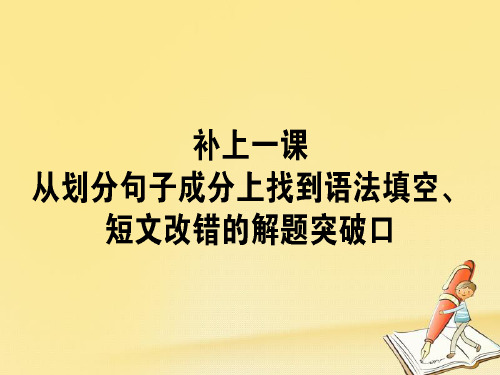
sent to the children in the countryside the other day.
据报道,同学们提供的所有书籍都在几天前送给了乡下的孩子
们。
(过去分词短语作定语)
③How
Li
Hua
regretted
the_valuable_time_(that)_he_had_wasted_on_the_computer!
(实义动词作谓语)
②(2017·天津卷书面表达)To begin with,the final exam of this
term is around the corner so I am busy preparing for it. 首先,期末考试临近,因此我忙于准备考试。 (系表结构作谓语) ③(2017·全国卷Ⅱ书面表达)The exhibition will start from June
每次比赛之后我们将挑选最好的选手。 (介词短语作状语)
③(2017·全国 卷 Ⅲ 书面 表 达 )If_you_will_join,_you may send your information to intlpssppt@gmschool. com.
要是你参加,请把信息发送到 intlpssppt@gmschool. com.邮箱。 (从句作状语)
李华多么后悔浪费在玩电脑游戏上的宝贵时间!
(形容词和从句作定语)
六、状语——动词、形容词、副词或句子的修饰语 状语是用于修饰动词、形容词、副词或整个句子的一种成分。 可以用作状语的有:副词、名词、数词、形容词、介词、短语、不 定式、分词、独立主格和从句等。
①(2017·全国卷Ⅱ书面表达)Visiting_this_exhibition we will not
高考英语二轮总复习第2部分专题2语法填空考法一有提示词类第2讲提示词为名词代词形容词或副词课件
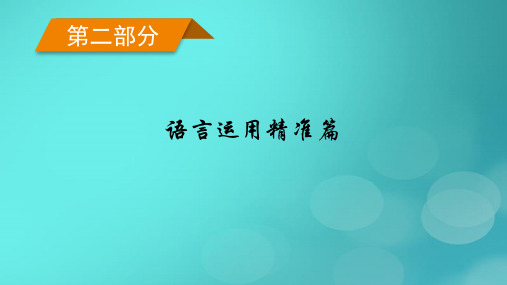
5.(2021·全国新高考Ⅰ卷)The amazing thing about the spring is that the colder the temperature gets,the ________(hot) the spring!
【答案】 interest 【解析】 考查名词。句意:月球背面让科学家尤其感兴趣。根据 空前的形容词particular可知,空处应填名词,interest是不可数名词, (sth.) be of interest to sb.意为“(某物)使某人感兴趣”。故填interest。
考点3 人称代词、物主代词、反身代词 辨明题类 所给提示词是代词时,一般考查人称代词变为物主代词。有时需考 虑人称代词单数变复数、主格变为宾格、人称代词变为反身代词等。 技法点拨 1.提示词为代词,分析句子成分所填词若作介词或者动词的宾 语,则考虑人称代词的宾格;若与主语是同一人,则考虑反身代词。
【答案】 extremely 【解析】 考查副词。句意:尽管这个小镇会因为不断的旅游团而 变得非常繁忙,它成功地保存了许多传统建筑。由副词修饰形容词可 知,此处为副词extremely修饰形容词busy。故填extremely。
真题体验 1.(2022·新高考Ⅱ卷)When he looked down, he ______ (accidental ) slipped and fell over the edge. 【答案】 accidentally 【解析】 考查副词。句意:当他往下看时,不小心滑了一跤,从 悬崖边上掉了下去。根据句子结构可知,设空处应该用副词修饰动词 slipped 。 accidental 为 形 容 词 , 意 为 “ 意 外 的 , 失 误 的 ” , 其 副 词 为 accidentally,意为“意外地,失误地”。故填accidentally。
高考英语二轮总复习 第一部分 语篇型语法填空和短文改错 专题四 动词和动词词组

3.(2020·全国Ⅰ卷改编)After that I poured oil into a pan and ___t_u_r_n_o_n_____(打开) the stove,I waited patiently unless the oil was hot. 解析:考查动词词组。句意:把油倒入锅中后,我就打开炉灶,耐心地等待着, 除非油已经热了。turn on 意为“打开(设备)”。 4.(2020·江苏卷改编)When Wilson returned home from hospital two months
It takes me three hours to finish this work. 完成这项工作花费了我三个小时。
⑨wear与dress wear “穿着”,表示状态,可用于进行时态; dress既可用来表示状态,又可用来表示动作,其后接人。 He was wearing a blue suit.=He was dressed in a blue suit. 他穿着一套蓝色西服。
(3)bring构成的词组 bring about导致,引起 bring down使倒下;降低(费用、开支、价格等) bring on使发展,有助于生长;引起 bring out使显现;阐明;出版 bring up养育;抚养;呕吐;提出(讨论等)
(4)call构成的词组 call for需要;要求,呼吁 call on号召;访问 call in打电话汇报;召来 call up呼唤;征召入伍;打电话 call off取消 (5)carry构成的词组 carry on继续,坚持 carry out执行,实施 carry off赢得;获得;成功地对付 carry through帮助……渡过(难关);成功完成;顺利实现
2018年高考英语二轮复习专题辅导与测试一语法主导下的语法填空与短文改错专题学案(十二)构词法课件
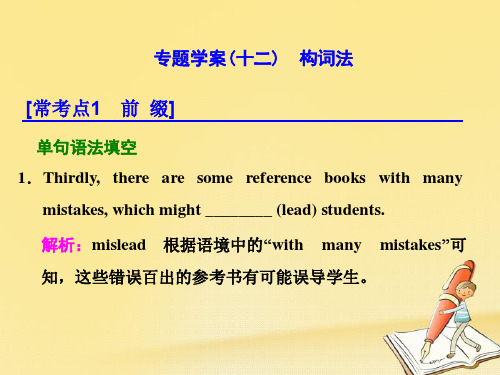
(5)irirregular irrelevant irresponsible (6)nonnonstop nonprofit nonviolent nonverbal nonsmoker nonprofessional 不停的,不间断的 非盈利的 非暴力的 非言语的 不吸烟者 非专业的 不规则的 不相关的 不负责任的
6.His eyes were shut and he seemed to have fallen ______ (sleep).
解析:asleep 固定短语 fall asleep 意为“睡着了”。
[规则谨记]
1.表示否定意义的前缀
(1)ununhappy unusual unfortunate unable uncomfortable unfit 不高兴的 不同寻常的 不幸的 不能够的 不舒服的 不合适的
(6)ance 或 ence acceptance importance appearance performance existence preference reference 接受 重要性 出现,相貌 演出,表演 存在 偏爱 参考;查阅
(7)(t)y difficulty cruelty safety responsibility (8)al arrival approval survival proposal 到达 赞成,批准 幸存 提议,建议 困难 残忍 安全 职责,责任
2.(2016· 全国卷Ⅱ)Then, handle the most important tasks first so you'll feel a real sense of ________ (achieve).
解析:achievement 是 achievement。
高考英语二轮语法填空 提示词为动词考非谓语动词课件

迟没得想 (2)
(2)
excuse/pardon; find/think/believe/consider/make/feel+it+adj.
下列动词(短语)接省略to的动词不定式作宾语补足语:
admit,
delay/put
off,
fancy
避免错过继续练,否认完 (2) 过去分词作宾语补足语表示被动、完成
(3) 下列名词或代词,常用不定式作定语。 ability, chance,opportunity, plan, attempt, way, something, idea,
hope, wish, fact, excuse, promise等。
5. 状语: (1)作目的状语。表示“为了”,可以单独放在句首、句中或句
能或目的。
4. 宾语: P 46 “十六”第2点 (1) 介词 + v -ing (注意to为介词的情况); (2) 下列动词(短语)只能用动名词作宾语:
考虑建议盼原谅,承认推 T(2h)e下p列eo动ple词7(.短语)接省略to的动词不定式作宾语补足语c:onsider, suggest/advise, look forward to,
完成 先于谓语动词的动 having having been
式
作完成
done
done
提示词为动词- 考非谓语动词 - 分词 v-ing / v-ed 1. (2019·北京卷) Nervously _f_ac_i_n_g____ (face) challenges, I know I will whisper to myself the two simple words “Be yourself”. 2.According to the study, when __fa_c_e_d____ (face) with the new challenges, fast walkers are more likely to be active while quiet people tend to walk more slowly. 3. (2019·北京卷) Earth Day,___m_a_r_k_e_d____(mark)on 22 April,is an annual event aiming to raise public awareness about environmental protection.
高中英语高考新高考英语二轮复习课件 专题四 语法填空 (116张PPT)
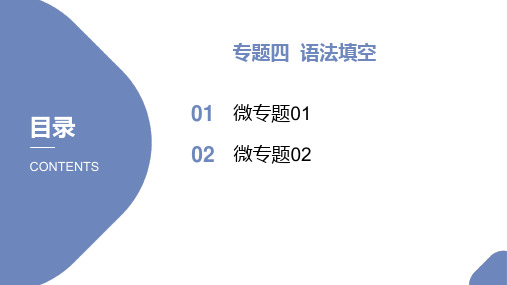
体裁
主题
记叙文 游览黄山的
感受
说明文 博物馆的相
关知识
说明文 生态旅游的
内涵
中国无人探
说明文 测器登月成
功
说明文 北极熊现状
有提示词
无提示词
短文
词数 谓语 非谓语 词类 名词 代 比较 冠词 介词 连接 代词 副词 限定
动词 动词 转化
词 等级
词
词
206
1
1
2
1
1
1
1
/
2
/
/
/
206
3
1
2
/
1
/
/
1
exhibits, visitors can play with computer simulations (模拟) and imagine 42.____(they)
living at a different time in history or 43.______(walk) through a rainforest. At the Jorvik
entertainment. Museums must compete 45.______people’s spare time and money with
other amusements. Most museums also welcome school groups and arrange special
Centre in York, the city’s Viking settlement is recreated, and people experience the sights,
sounds and smells of the old town. Historical 44._____(accurate) is important but so is
高考英语 二轮复习 题型专题突破 五 语法填空

专题五 语法填空
Yangshuo 7.______is______(be) really beautiful.A study of travelers 8.__c_o_n_d_u_c_t_e_d__(conduct) by the website TripAdvisor names Yangshuo as one of the top 10 destinations in the world.And the town is fast becoming a popular weekend destination for people in Asia.Abercrombie & Kent,a travel company in Hong Kong,says it 9.___r_e_g_u_la_r_l_y__(regular) arranges quick getaways here for people 10.___l_iv_i_n_g___ (live) in Shanghai and Hong Kong. 【解题导语】 本文是一篇游记,记述了作者游览阳朔的所 见、所闻、所感。
栏目 导引
专题五 语法填空
1.解析:考查时态。由主句中的was和后一句中的didn’t可 知,这里使用一般过去时态。 2.解析:考查副词。根据句意和I’d been at home的时态可 知此处表示“几个小时前,我待在香港的家里”,“待在家 里”应该是发生在过去动作arrived之前,故此处填before或 earlier均可。 3.解析:考查代词。因为smog是名词,所以需要用it的形容 词性物主代词形式。 4.解析:考查定语从句的引导词。根据句意和句子结构可知 此处是一个定语从句,因为先行词是物,且引导词在定语从 句中作主语,所以用that或which引导从句。
高考英语二轮复习无提示词语法填空课件

2.(2022·新高考Ⅰ卷)The GPNP is intended to provide stronger protection for all the
species that live within the Giant Panda Range and significantly improve
the health of the ecosystem in the area. 3.(2022·全国甲卷)On the 1,100kilometer journey, the man Cao Shengkang,
5.(2022·新高考Ⅱ卷)
Brown family live in an apartment building
outside Toronto. “定冠词+姓氏+family名词或“形容词+名词”前没有形容词性物主代词、不定代词、 名词所有格或指示代词等限定词,空处很可能填冠词。
to speak
she could do so remotely.
3.(2020·浙江卷)Over thousands of years, they began to depend less on
could be
hunted or gathered from the wild, and more on animals they had raised and crops they had
2.(2023·全国甲卷)She warns of the environmental dangers facing society,and she
teaches that people must take responsibility
saving their environment.
2018高考英语语法填空词性转换经典总结材料

语法填空词形转换A1.ability [əˈbɪlɪtɪ] n.能力;才能able [ˈeɪb(ə)l] a.能够;有能力的1.absence [ˈæbsəns] n. 不在,缺席absent [ˈæbsənt] a. 缺席,不在3. academic [ækəˈdemɪk] a. / n. 学术的,教学的academy [əˈkædəmɪ] n.专科学院,(美)私立学校4. access [ˈækses] n. / v. 通道,入径,存取(计算机文件)accessible [əkˈsesɪb(ə)l] a. 可到达的,可接受的5. achieve [əˈtʃiːv] vt. 达到,取得achievement [əˈtʃiːvmənt] n. 成就,成绩,功绩6. act [ækt] n. 法令,条例v. (戏)表演,扮演(角色),演出(戏);行动,做事action [ˈækʃ(ə)n] n. 行动active [ˈæktɪv] a. 积极的,主动的activity [ækˈtɪvɪtɪ] n. 活动7. adapt [əˈdæpt] v. 使适应,适合,改编adaptation [ədæpˈteɪʃ(ə)n] n. 适应,改编本8. adjust [əˈdʒʌst] v.调整,调节,适应,习惯adjustment [əˈdʒʌstmənt] n. 调整,适应9. admirable [ˈædmərəb(ə)l] a.值得赞赏的,可钦佩的admire [ədˈmaɪə(r)] v. 钦佩;羡慕admission [ədˈmɪʃ(ə)n] n. 准入,接纳admit [ədˈmɪt] vt. 承认,准许(入场,入学,入会)10. advertise [ˈædvətaɪz] vt. 为……做广告advertisement [ədˈvɜːtɪsmənt] n. 广告11.agree [əˈɡriː] v. 同意;应允agreement [əˈɡriːmənt] n. 同意,一致;协定,协议12. amaze [əˈmeɪz] v. 惊奇,惊叹;震惊amazed 感到惊讶的amazing [əˈmeɪzɪŋ] a.惊奇,惊叹的;震惊的be amazed at 对..感到惊讶13.amuse [əˈmjuːz] vt. (使人)快乐,逗乐amused 感到愉快的学-*科+/网amusing 令人愉快的amusement [əˈmjuːzmənt] n. 娱乐14. analyze/ `ænl,aɪz / v. 分析analysis [əˈnæləsɪs] n. 分析,分析结果15.anger [ˈæŋɡə(r)] n. 怒,愤怒angry [ˈænɡrɪ] a. 生气的,愤怒的16.anxiety [æŋˈzaɪətɪ] n. 担忧,焦虑anxious [ˈæŋkʃəs] a. 忧虑的,焦急的17.apologize [əˈpɔlədʒaɪz] vi. 道歉,谢罪apology [əˈpɔlədʒɪ] n. 道歉;歉意18.appear [əˈpɪə(r)] vi. 出现appearance [əˈpɪərəns] n. 出现,露面;容貌19. application [æplɪˈkeɪʃ(ə)n] n. 申请apply [əˈplaɪ]v. 申请20. appoint [əˈpɔɪnt] v. 任命,委任,安排appointment [əˈpɔɪntmənt] n. 约会appreciate [əˈpriːʃɪeɪt] v. 欣赏;感激appreciation [əpriːʃɪˈeɪʃ(ə)n] n. 欣赏,鉴定,评估21.appropriate [əˈprəʊprɪət] a. 合适的,恰当的approximately [əprɔksɪˈmətlɪ] ad.近似,大约22.argue [ˈɑːɡjuː]vi. 争辩,争论argument [ˈɑːɡjʊmənt] n. 争论,辩论23.arrange [əˈreɪndʒ] v. 安排,布置arrangement [əˈreɪndʒmənt]n. 安排,布置24.arrival [əˈraɪv(ə)l] n. 到来,到达arrive [əˈraɪv] vi. 到达;- at 小地方,- in大地方25.assess [əˈses] v.评价,评定(性质,质量)assessment [əˈsesmənt] n. 看法,评价26.assist [əˈsɪst]v. 帮助,协助assistance [əˈsɪst(ə)ns] n. 帮助,援助,支持assistant [əˈsɪst(ə)nt] n. 助手,助理27.associate [əˈsəʊʃɪeɪt] v. 联想,联系association [əsəʊsɪˈeɪʃ(ə)n] n. 协会,社团,联系28.assume [əˈsjuːm;(US) əˈsuːm] v. 假定,假设assumption [əˈsʌmpʃ(ə)n] n. 假定,假设29.attract [əˈtrækt] v. 吸引,引起attraction [əˈtrækʃ(ə)n] n. 吸引,爱慕attractive [əˈtræktɪv] a. 迷人的,有吸引力的B1. bad (worse,worst) [bæd] a. 坏的;有害的,严重的badly [ˈbædlɪ] ad. 坏,恶劣地2.bath [bɑːθ;(US) bæθ] n. 洗澡;浴室;澡盆bathe [beɪð] vi. 洗澡;游泳3.beautiful [ˈbjuːtɪf(ə)l] a. 美,美丽,美观的beauty [ˈbjuːtɪ] n. 美丽,美人4. behave [bɪˈheɪv] v. 守规矩,行为behaviour/ bɪ`heɪvjər / n. 行为,举止5. beneficial [benɪˈfɪʃ(ə)l] a. 有利的,有帮助的,有用的benefit [ˈbenɪfɪt] n. / v.优势,益处,使…受益6. bored / bɔrd / a.(对人,事)厌倦的,烦闷的boring / `bɔrɪŋ / a. 乏味的,无聊的7.brave [breɪv] a. 勇敢的bravery [ˈbreɪvərɪ] n. 勇气8.breath [breθ] n. 气息;呼吸breathe [briːð] vi. 呼吸breathless [ˈbreθlɪs] a. 气喘吁吁的,上气不接下气的9. build (built,built) [bɪld] v. 建筑;造building [ˈbɪldɪŋ] n. 建筑物;房屋;大楼C1.care [keə(r)] n. 照料,保护;小心v. 介意……,在乎careful [ˈkeəfʊl] a. 小心,仔细,谨慎的careless [ˈkeəlɪs] a. 粗心的,漫不经心的2. caution [ˈkɔːʃ(ə)n] n. 谨慎,小心,警告cautious [ˈkɔːʃəs] a. 小心的,谨慎的3.celebrate [ˈselɪbreɪt] v. 庆祝celebration [selɪˈbreɪʃ(ə)n] n. 庆祝;庆祝会4.entre 中心central 中心的5. certain [ˈsɜːt(ə)n] a.确定的,无疑的;一定会……certainly [ˈsɜːtənlɪ] ad. 当然;一定,无疑6. challenge [ˈtʃælɪndʒ] n.挑战(性)challenging [ˈtʃælɪndʒɪŋ] a.具有挑战性的7.changeable [ˈtʃeɪndʒəb(ə)l] a.易变的,变化无常的change [tʃeɪndʒ] n. 零钱;找头v. 改变,变化;更换;8.cheer [tʃɪə(r)] n. & vi.欢呼;喝彩Cheer up [tʃɪə(r)-ʌp] 振作起来!提起精神!cheerful [ˈtʃɪəfʊl] a.兴高采烈的,快活的cheers [tʃɪə(r)] int. 干杯,(口)谢谢,再见9.chemical [ˈkemɪk(ə)l] a. 化学的n. 化学品chemist [ˈkemɪst] n. 药剂师;化学家chemistry [ˈkemɪstrɪ] n. 化学学+-科/+网10.child (复children) [tʃaɪld] n. 孩子,儿童childhood [ˈtʃaɪldhʊd] n. 幼年时代,童年11.civil [ˈsɪv(ə)l] a. 国内的;平民(非军人)的;民用的civilian [sɪˈvɪlɪən] n. 平民,老百姓civilization [sɪvɪlaɪˈzeɪʃ(ə)n;n. 文明12.clean [kliːn] vt. 弄干净,擦干净a. 清洁的,干净的cleaner [kliːnə(r)] n.清洁工.,清洁器.,清洁剂13.clear [klɪə(r)] a. 清晰;明亮的;清楚的clearly [ˈklɪəlɪ] ad. 清楚地,无疑地14.cloud [ˈkləʊðɪŋ] n. 云;云状物;阴影cloudy [ˈklaʊdɪ] a. 多云的,阴天的fort [ˈkʌmfət] n. 安慰;慰问comfortable [ˈkʌmfətəb(ə)l;(US) ˈkʌmfərtəbl] a. 舒服的;安逸的;舒服自在的mit [kəˈmɪt] v.犯(罪,错),自杀commitment [kəˈmɪtmənt] n. 承诺,允诺,承担municate [kəˈmjuːnɪkeɪt] v. 交际;传达(感情,信息等)communication [kəmjuːnɪˈkeɪʃ(ə)n] n.交际,通讯pete [kəmˈpiːt] vi. 比赛,竞赛competence [ˈkɔmpətəns] n.能力,胜任,管辖权competition [kɔmpəˈtɪʃ(ə)n] n. 比赛,竞赛competitor [kəmˈpetɪtə(r)] n. 竞赛者,比赛者19.conclude [kənˈkluːd] v. 完成,结束conclusion [kənˈkluːʒ(ə)n] n. 结论;结束20.consider [kənˈsɪdə(r)] vt. 考虑considerate [kənˈsɪdərət] a. 体贴的consideration [kənsɪdəˈreɪʃ(ə)n] n. 考虑;关心21.convenience n. convenient adj. 方便的22.construct [kənˈstrʌkt] v. 构筑;建造,建设construction [kənˈstrʌkʃ(ə)n] n.建造,建设,建筑物D1.danger [ˈdeɪndʒə(r)] n. 危险dangerous [ˈdeɪndʒərəs] a. 危险的2.dark [dɑːk] n. 黑暗;暗处;日暮a. 黑暗的;深色的darkness [ˈdɑːknɪs] n. 黑暗,阴暗3.die [daɪ] v. 死dead 死的,无生命的death [deθ] n. 死4.decide [dɪˈsaɪd] v. 决定;下决心decision [dɪˈsɪʒ(ə)n] n. 决定;决心5.deep [diːp] a. 深ad. 深;深厚deeply [ˈdiːplɪ] ad. 深深地depth [depθ] n. 深,深度66.delight [dɪˈlaɪt] n. 快乐;乐事delighted [di'laitid] a. 高兴的,快乐的7.develop [dɪˈveləp] v. (使)发展;(使)发达;(使)发育;开发vt. 冲洗(照片)development [dɪˈveləpmənt] n. 发展,发达,发育,8.devote [dɪˈvəʊt] vt. 把…奉献,把…专用(于)devotion [dɪˈvəʊʃ(ə)n] n. 奉献,奉献精神9.differ [ˈdɪfə(r)] v. 相异,有区别difference [ˈdɪfrəns] n. 不同different [ˈdɪfrənt] a. 不同的,有差异的10.difficult [ˈdɪfɪkəlt] a.难;艰难;不易相处difficulty [ˈdɪfɪkəltɪ] n. 困难,费力11.disagree [dɪsəˈɡriː] vi. 意见不一致,持不同意见disagreement [dɪsəˈɡriːmənt] n. 意见不一致;争论12.disappoint [dɪsəˈpɔɪnt]vt. 使失望be disappointed at 感到失望的disappointing令人失望的disappointment [dɪsəˈpɔɪntmənt] n. 失望;沮丧13.discover [dɪˈskʌvə(r)] vt. 发现discovery [dɪˈskʌvərɪ] n. 发现14.discuss [dɪsˈkʌs] vt. 讨论,议论discussion [dɪsˈkʌʃ(ə)n] n. 讨论,辩论15.distance [ˈdɪstəns] n. 距离distant [ˈdɪst(ə)nt] a. 远的,遥远的E1.easy [ˈiːzɪ] a. 容易的,不费力的easily [ˈiːzɪlɪ] ad. 容易地2.east [iːst]a. 东方;东部的;朝东的;ad. 在东方;eastern [ˈiːst(ə)n] a. 东方的;东部的cate [ˈedjʊkeɪt] vt. 教育,培养educator ['edju:keitə(r)] n. 教育家education [edjʊˈkeɪʃ(ə)n] n. 教育,培养4.engine [ˈendʒɪn] n. 发动机,引擎学+-科/-网engineer [endʒɪˈnɪə(r)] n. 工程师;技师5.enjoy [ɪnˈdʒɔɪ] vt.欣赏;享受乐趣;喜欢enjoyable [ɪnˈdʒɔɪəb(ə)l]a. 愉快的;有趣的6.equal [ˈiːkw(ə)l] a.平等的vt.等于,使等于equality [iːˈkwɔlətɪ] n. 平等82.equip [ɪˈkwɪp] vt. 提供设备;装备;配备equipment [ɪˈkwɪpmənt] n. 装备,设备7.exact [ɪɡˈzækt] a. 精确的;确切的exactly [ex'act·ly] ad. 精确地;确切地8.exist [ɪg'zɪst] vi. 存在existence [ɪɡˈzɪst(ə)ns] n.存在;生存;存在物9.explain [ɪksˈpleɪn] vt. 解释,说明explanation [ekspləˈneɪʃ(ə)n] n. 解释,说明10.express [ɪkˈspres] vt. 表达;表情n. 快车,特快专递expression [ɪkˈspreʃ(ə)n]n. 表达;词句;表情11.extreme [ɪkˈstriːm] a. 极其的,非常的extremely [ɪkˈstriːmlɪ] ad. 极其,非常F1.fail [feɪl] v. 失败;不及格;衰退failure [ˈfeɪljə(r)] n. 失败2.fair [feə(r)] a. 公平的,合理的a. (肤色)白皙的;(人)白肤金发的n. 集市;庙会;展览会fairly [ˈfeəlɪ] ad. 公正地,正当地;相当(程度)地fairness ['fɛənis] n. 公平;公正3.firm [fɜːm] n.公司;企业a.坚固的,坚定的firmly [ˈfɜːmlɪ] ad. 牢牢地4.fluency ['fluənsi] n.(外语)流利,流畅fluent [ˈfluːənt] a. (外语)流利的,流畅5.fool [fuːl] n. 傻子,蠢人foolish [ˈfuːlɪʃ] a. 愚蠢的,傻的6.foreign [ˈfɔrən;(US) ˈfɔːrɪn] a. 外国的foreigner [ˈfɔrənə(r)] n. 外国人7.forget [fəˈrevə(r)] (forgot,forgotten) v. 忘记;忘掉forgetful [fəˈɡetfʊl] a. 健忘的,不留心的8.fortunate [ˈfɔːtʃənət] a. 幸运的;侥幸的fortune [ˈfɔːtjuːn,ˈfɔːtʃuːn] n. 财产;运气9.free [friː] a. 自由,空闲的;免费的freedom [ˈfriːdəm] n. 自由10.friend [frend] n. 朋友friendly [ˈfrendlɪ] a. 友好的friendship [ˈfrendʃɪp] n. 友谊,友情G1.gift [ɡɪft] n. 赠品;礼物gifted [ˈɡɪftɪd] a. 有天赋的;有才华的2.grow (grew,grown) [ɡrəʊ] v. 生长;发育;种植;变成growth [ɡrəʊθ] n. 生长,增长3. guidance [ˈɡaɪdəns] n. 引导,指导guide [ɡaɪd] n. 向导,导游者H1. happy [ˈhæpɪ] a.幸福;快乐的,高兴的happily ['hæpɪlɪ] ad. 幸福地,快乐地happiness [ˈhæpɪnɪs] n. 幸福,愉快2. hard [hɑːd] ad. 努力地;使劲;猛烈地a.硬的;困难的;艰难的hardly [ˈhɑːdlɪ] ad. 几乎不hardship [ˈhɑːdʃɪp] n. 困难3. harm [hɑːm] n.&v. 伤害;损伤harmful [ˈhɑːmfʊl] a.有害的;致伤的harmless [ˈhɑːmlɪs] a. 无害的;不致伤的4. health [helθ] n. 健康,卫生healthy [ˈhelθɪ] a. 健康的,健壮的5.heavy [ˈhevɪ] a. 重的heavily [ˈhevɪlɪ] ad. 重地,大量地6.help [help] n. & vt. 帮助,帮忙helpful [ˈhelpfʊl] a. 有帮助的,有益的7.hope [həʊp] n.& v. 希望hopeful [ˈhəʊpfʊl] a. 有希望的;有前途的hopeless a.没有希望,不可救药的8.humorous [ˈhjuːmərəs] a. 富于幽默的humour (美humor) ['hju:mə] n.幽默,幽默感9. hunger [ˈhʌŋɡə(r)] n. 饥饿hungry [ˈhʌŋɡrɪ] a. (饥)饿的I1. ill [ɪl] a. 有病的;不健康的illness [ˈɪlnɪs] n. 疾病1. importance [ɪmˈpɔːt(ə)ns] n. 重要性important [ɪmˈpɔːtənt] a. 重要的3. imagine vt. 想象imaginary adj. 想象的imagination n. 想象4. impossible [ɪmˈpɔsɪb(ə)l] a. 不可能的possible 可能的5. impress [ɪmˈpres] vt. 留下极深的印象impression [ɪmˈpreʃ(ə)n] n. 印象,感觉6. improve 改善,提高improvement7.independent 独立的independence8. instruct [ɪnˈstrʌkt] vt. 通知;指示;教instruction [ɪnˈstrʌkʃ(ə)n] n. 说明,须知;教导9. interest [ˈɪntrəst] n. 兴趣,趣味;利息interesting [ˈɪntrətɪŋ] a. 有趣的interested 感兴趣的10. intelligence 智力,intelligent 聪明的11. introduce [ɪntrəˈdjuːs;(US) -duːs] vt. 介绍introduction [ɪntrəˈdʌkʃ(ə)n] n. 引进,介绍12. invent [ɪnˈvent] vt. 发明,创造invention [ɪnˈvenʃ(ə)n] n. 发明,创造13. invitation [ɪnvɪˈteɪʃ(ə)n] n. 邀请,请帖invite [ɪnˈvaɪt] vt. 邀请,招待J1. judge [dʒʌdʒ] n. 裁判;审判员;法官vt. 判断,断定judgement ['dʒʌdʒmənt] n. 裁判2. juice [dʒuːs] n. 汁、液学+-科/+网juicy [dʒuːsɪ] a. 多汁的;水分多的K1. kind [kaɪnd] n. 种;类a. 善良,友好的kindness [ˈkaɪndnɪs] n. 仁慈;善良L1. last [lɑːst;(US) læst] a.最近刚过去;最后的ad.最近刚过去;最后地n.最后v.持续late [leɪt] a.晚的,迟的ad.晚地,迟地lately [ˈleɪtlɪ] ad. 最近,不久前later [ˈleɪtə(r)] a. 晚些的,迟些的latest [ˈleɪtɪst] a.最近,最新的;最晚的latter [ˈlætə(r)] n.(两者之中的)后者zy 懒惰的lazily 懒惰地laziness n. 懒惰3. laugh [lɑːf] n.& v. 笑,大笑;嘲笑laughter [ˈlɑːftə(r);(US) ˈlæftər] n. 笑;笑声4. learn (learnt,learnt;--ed --ed) [lɜːn] vt. 学,学习,学会learned [ˈlɜːnɪd] a. 有才华的;博学的5. live [lɪv] vi. 生活;居住;活着a. 活的,活着的;实况,现场(直播)的lively [ˈlaɪvlɪ] a. 活泼的;充满生气的living [ˈlɪvɪŋ] a. 活着的n. 生计6. legal 合法的illegal 违法的7. loud [laʊd] a. 大声的loudly [laʊdlɪ] ad. 大声地8. love [lʌv] n.& vt. 爱;热爱;很喜欢lovely [ˈlʌvlɪ] a. 美好的,可爱的9. luck [lʌk] n. 运气,好运lucky [ˈlʌkɪ] a. 运气好,侥幸M1. marriage [ˈmærɪdʒ] n. 结婚,婚姻married [ˈmærɪd] a. 已婚的marry [ˈmærɪ] v.(使)成婚,结婚2. memory [ˈmemərɪ] n. 回忆,记忆memorize [ˈmeməraɪz] v. 记忆3.mental [ˈment(ə)l] a. 精神的;脑力的mentally [ˈmentəlɪ] ad. 精神上;智力上4.merciful [ˈmɜːsɪfʊl] a. 仁慈的;宽大的mercy [ˈmɜːsɪ] n. 怜悯5.mess [mes] n. 凌乱messy [ˈmesɪ] a. 乱七八糟的6. mistake (mistook,mistaken) [mɪsˈteɪk] n. 错误vt. 弄错mistaken [mɪsˈteɪkən] a. 错误的7. mix [mɪks] v. 混合,搅拌mixture [ˈmɪkstʃə(r)] n. 混合物8. move [muːv] v. 移动,搬动,搬家movement [ˈmuːvmənt] n. 运动,活动9. modern 现代的modernize vt.使现代化modernization 现代化N1. nature [ˈneɪtʃə(r)] n. 自然,性质,种类natural [ˈnætʃər(ə)l] a. 自然的2. nation 国家national 国家的nationality 国籍3. near [nɪə(r)] a. 近的ad. 附近,邻近prep. 在……附近,靠近nearby [ˈnɪəbaɪ] a. 附近的nearly [ˈnɪəlɪ] ad. 将近,几乎4. necessary 必需的necessarily 必需地necessity n. 必需品5. nine [naɪn] num. 九ninth [naɪnθ] num. 第九6. noise [nɔɪz] n. 声音,噪声,喧闹声noisily ['nɔɪzɪlɪ] ad. 喧闹地noisy [ˈnɔɪzɪ] a. 喧闹的,嘈杂的7. normal [ˈnɔːm(ə)l] n.& a. 正常的(状态)abnormal 反常的normally adv.正常地8. north [nɔːθ] a.北的;朝北的;从北来的ad.向(在,从)北方n.北;北方;北部northern [ˈnɔːð(ə)n] a. 北方的,北部的northwards [ˈnɔːθwədz] ad. 向北(学科)网9. novel [ˈnɔv(ə)l] n. (长篇)小说novelist [ˈnɔvəlɪst] n. 小说家10. nurse [nɜːs] n. 护士;保育员nursery [ˈnɜːsərɪ] n. 托儿所nursing [nɜːsɪŋ] n.(职业性的)保育,护理O1. operate[ˈɔpəreɪt] v. 做手术,运转;实施,负责,经营,管理operation [ɔpəˈreɪʃ(ə)n] n. 手术,操作operator [ˈɔpəreɪtə(r)] n. 接线员2. oppose [əˈpəʊz] vt. 反对;反抗opposite [ˈɔpəzɪt] n. 相反,对面a. 相反的,对面的3. organize ['ɔ:gənaiz] vt. 组织organiser (organizer) ['ɔ:gənaizə] n. 组织者organization [ɔːɡənaɪˈzeɪʃ(ə)n]n. 组织,机构P1. pain [peɪn] n. 疼痛,疼painful [ˈpeɪnfʊl] a. 使痛的,使痛苦的paint [peɪnt] n.油漆vt.油漆,粉刷,绘画painter [ˈpeɪntə(r)] n. 绘画者,(油)画家painting [ˈpeɪntɪŋ] n. 油画,水彩画2. part [pɑːt] n. 部分;成分partly [ˈpɑːtlɪ] ad.部分地,在一定程度上3. patience n. 容忍;耐心patient [ˈpeɪʃ(ə)nt] n. 病人,耐心的4. peace [piːs] n. 和平peaceful [ˈpiːsfʊl] a. 和平的,安宁的5. perform [pəˈfɔːm] v. 表演,履行;行动performance [pəˈfɔːm] n. 演出,表演performer [pəˈfɔːmə(r)] n. 表演者,执行者6. person [ˈpɜːs(ə)n] n. 人personal [ˈpɜːsən(ə)l] a. 个人的,私人的personnel [pɜːsəˈnel] n. 全体人员,职员personally [ˈpɜːsənəlɪ] ad. 就自己而言7.physical [ˈfɪzɪk(ə)l] a. 身体的;物理的physician [fɪˈzɪʃ(ə)n] n.(有行医执照的)医生8. physicist [ˈfɪzɪsɪst] n. 物理学家physics [ˈfɪzɪks] n. 物理(学)9. pleasant [ˈplezənt] a. 令人愉快的,舒适的please [pliːz] v. 请,使人高兴,使人满意pleased [pliːzd] a. 高兴的pleasure [pliːzd] n. 高兴,愉快10. poem [ˈpəʊɪm] n. 诗poet [ˈpəʊɪt] n. 诗人11. poison [ˈpɔɪz(ə)n] n. 毒药poisonous [ˈpɔɪzənəs] a. 有毒的,致命的12. pollute [pəˈluːt] vt. 污染pollution [pəˈluːʃ(ə)n] n. 污染13. possess [pəˈzɪʃ(ə)n] vt. 占有;拥有possession [pəˈzeʃ(ə)n] n. 所有,拥有;财产,所有物14. possibility [pɔsɪˈbɪlɪtɪ] vn. 可能,可能性possible [ˈpɔsɪb(ə)l] a. 可能的15. power [ˈpaʊdə(r)] n. 力,动力,电力powerful [ˈpaʊəfʊl] a. 效力大的,强有力的,强大的16. practical [ˈpræktɪk(ə)l] a. 实际的,适用的practice(s)e [ˈpræktɪs] n. 练习17. prefer [prɪˈfɜː(r)] vt.宁愿(选择),更喜欢preference [ˈprefərəns] n. 选择,趋向18. preparation [prepəˈreɪʃ(ə)n] n. 准备prepare [prɪˈpeə(r)] vt. 准备,预备,调制,配制19.press [ˈprezɪdənt] vt.压,按n.新闻界,出版社pressure [ˈpreʃə(r)] n. 压迫,压力,压强20. probable [ˈprɔbəb(ə)l] a.很可能,很有希望的probably [ˈprɔbəb(ə)lɪ] ad. 很可能,大概21. produce [prəˈdjuːs;(US) -ˈduːs] vt. 生产;制造product [ˈprɔdʌkt] n. 产品,制品production [prəˈdʌkʃ(ə)n] n. 生产;制造22. pronounce [prəˈnaʊns] vt. 发音pronunciation [prənʌnsɪˈeɪʃ(ə)n] n. 发音23. proper [ˈprɔpə(r)] a. 恰当的,合适的properly [ˈprɔpəlɪ] ad. 适当地24. protect [prəˈtekt] vt. 保护protection [prəˈtekʃ(ə)n] n. 保护25. proud [praʊd] a. 自豪的;骄傲的pride [praɪd] n. 自豪,骄傲26. puzzle [ˈpʌz(ə)l] n. 难题,(字、画)谜puzzled [ˈpʌz(ə)l] a. 迷惑的,困惑的R 1. rain [reɪn] n. 雨,雨水vi. 下雨rainy [ˈreɪnɪ] a. 下雨的;多雨的2. real [riːl] a. 真实的,确实的reality [rɪˈælɪtɪ] n. 现实realise (美realize) [ˈrɪəlaɪz] vt.认识到,实现really v [ˈrɪəlɪ] ad. 真正地;到底;确实3. reason [ˈriːz(ə)n] vi.评理,劝说n.理由,原因reasonable [ˈriːzənəb(ə)l] a. 合乎情理的4. refusal [rɪˈfjuːz(ə)l] n. 拒绝refuse [rɪˈfjuːz] vi. 拒绝,不愿5. relate [rɪˈleɪt] vi. 有关;涉及relation [rɪˈleɪʃ(ə)n] n. 关系;亲属relationship [rɪˈleɪʃənʃɪp] n. 关系relative [ˈrelətɪv] n. 亲属,亲戚6. rely [rɪˈlaɪ] v. 依赖,依靠学+.科/网reliable [rɪˈlaɪəb(ə)l] a. 可信赖的,可依靠的7. religion [rɪˈlɪdʒən] n. 宗教religious [rɪˈlɪdʒəs] a. 宗教的8. require [rɪˈkwaɪə(r)] vt. 需求;要求requirement [rɪˈkwaɪəmənt] n. 需要;要求;必要的条件9. reservation [rezəˈveɪʃ(ə)n] n. 预定reserve [rɪˈzɜːv] n. & v. 储备;预定S1.sad [sæd] a. (使人)悲伤的sadness [ˈsædnɪs] n. 悲哀,忧伤2. safe [seɪf] a. 安全的n. 保险柜safety [ˈseɪftɪ] n. 安全,保险3. sail [seɪl] n. 航行v. 航行,开航sailing [ˈseɪlɪŋ] n. 航海sailor [ˈseɪlə(r)] n. 水手,海员4. salt [sɔːlt,sɔlt] n. 盐salty [ˈsɔːltɪ,ˈsɔltɪ] a. 盐的,咸的,含盐的5. scene [sɪːn] n. (戏剧、电影等的)一场,场景,布景scenery [ˈsiːnərɪ] n. 风景,景色,风光6.science [ˈsaɪəns] n. 科学,自然科学scientific [saɪənˈtɪfɪk] a. 科学的scientist [ˈsaɪəntɪst] n. 科学家7. secure [sɪˈkjʊə(r)] a.安心的,有把握的,牢靠的security [sɪˈkjʊərɪtɪ] n. 安全,平安8. serve [sɜːv] vt. 招待(顾客等),服务service [ˈsɜːvɪs] n. 服务9. settle [ˈset(ə)l] vi. 安家,定居settlement [ˈsetəlmənt] n. 新拓居地;(美)部落,村落settler [ˈsetlə(r)] n. 移居者,开拓者10.sick [sɪk] a.有病,患病的,(想)呕吐sickness [ˈsɪknɪs] n. 疾病11. silence[ˈsaɪləns] n. 安静,沉默silentˈsaɪlənt] a. 无声的,无对话的12. simple[ˈsɪmp(ə)l] a. 简单的,简易的simplify[ˈsɪmplɪfaɪ] v. 使简化,使简易simply [ˈsɪmplɪ] ad.简单地,(加强语气)的确13. skill [skiː] n. 技能,技巧skilled [skiː] a. 熟练的;有技能的skillful [ˈskɪlf(ə)l]a. 熟练,精湛的,灵巧的skillfully ['skilfuli] ad. 精湛地,巧妙地14. sleep [sliːp]n. 睡觉sleep (slept,slept) [sliːp] vi. 睡觉sleepy [sliːp]a. 想睡的,困倦的,瞌睡的15.smell (smelt,smelt 或-ed,-ed) [smel] v. 嗅,闻到;发气味n. 气味smelly [ˈsmelɪ] a. 有臭味的,发出臭味的16.smoke [smaɪl] n. 烟v. 冒烟;吸烟smoker [ˈsməʊkə(r)] n. 吸烟者学+*科-*网smoking [ˈsməʊkɪŋ]n. 吸烟,抽烟;冒烟17.snow [snəʊ] n. 雪vi.下雪snowy [ˈsnəʊɪ] a. 雪(白)的;下雪的;多(积)雪的18.social [ˈsəʊʃ(ə)l]a. 社会的;社交的socialism [ˈsəʊʃəlɪz(ə)m] n. 社会主义socialist [ˈsəʊʃəlɪst] a. 社会主义的society [səˈsaɪətɪ]n. 社会19.spirit [ˈspɪrɪt]n. 精神spiritual [ˈspɪrɪtʃʊəl]a. 精神的;心灵的20. strength [streŋθ] n. 力量,力气strengthen [ˈstreŋθ(ə)n] vt. 加强,增强strong [strɔŋ;(US) strɔːɡ] a. 强(壮)的;坚固的;强烈的;坚强的21. succeed [səkˈsiːd] vi. 成功success [səkˈses] n. 成功successful [səkˈsesfʊl] a. 成功的,有成就的22. suffer [ˈsʌfə(r)] vi. 受苦,遭受suffering [ˈsʌfərɪŋ] n. 痛苦,苦难23. suggest [səˈdʒest;(US) səɡˈdʒest] vt. 建议,提议suggestion [səˈdʒestʃ(ə)n] n. 建议24. sun [sʌn] n. 太阳,阳光sunny [ˈsʌnɪ] a. 晴朗的;阳光充足的25. surround [səˈraʊnd]vt. 围绕;包围surrounding [səˈraʊndɪŋ] a. 周围的26. survival [səˈvaɪv(ə)l] n. 存活,幸存survive [səˈvaɪv] v.生存,存活,幸免于难T1. technical [ˈteknɪk(ə)l] a. 技术的,工艺的technique [ˈteknɪk(ə)l] n. 技术;技巧,方法technology [tekˈnɔlədʒɪ] n. 技术2. thank [θæŋk] vt. 感谢,致谢,道谢n. (复)感谢,谢意thankful [ˈθæŋkfʊl] a. 感谢的,感激的3. theoretical [θɪəˈretɪk(ə)l] a. 理论的theory [θɪəˈretɪk(ə)l] n. 理论4. thirst [θɜːd] n. 渴;口渴thirsty [ˈθɜːstɪ] a. 渴5. tire [ˈtaɪə(r)] vi. 使疲劳tired [ˈtaɪəd] a. 疲劳的,累的tiresome a. 令人厌倦的6. total [ˈtəʊt(ə)l] a. 总数的;总括的;完全的,全然的n.合计,总计v.合计为totally [ˈtɔt(ə)lɪ] ad. 总合地,完全地7. tour [tʊə(r)] n. 参观,观光,旅行tourism [ˈtʊərɪz(ə)m] n. 旅游业;观光tourist [ˈtʊərɪst] vn. 旅行者,观光者8. tradition [trəˈdɪʃ(ə)n] n. 传统,风俗traditional [trəˈdɪʃ(ə)n] a. 传统的,风俗的9. train [treɪn] n. 火车v. 培训,训练trainer [treɪˈnə(r)] n. 训练人;教练training [ˈtreɪnɪŋ] n. 培训10. translate [trænsˈleɪt] vt. 翻译translation [trænsˈleɪʃ(ə)n] n. 翻译;译文translator [træns'leitə] n. 翻译家,译者11. travel [ˈtræv(ə)l] n.& vi.旅行traveler [ˈtrævələ(r)] n. 旅行者12. treat [triːt] vt. 对待,看待treatment [ˈtriːtmənt] n. 治疗,疗法13. trouble [ˈtrʌb(ə)l] vt. 使苦恼,使忧虑,使麻烦n.问题,疾病,烦恼,麻烦troublesome [ˈtrʌb(ə)lsəm] a.令人烦恼,讨厌14. true [truː] a. 真的,真实的;忠诚的truly [ˈtruːlɪ] ad. 真正地,真实地truth [truːθ] n. 真理,事实,真相,实际15. type [ˈtaɪp] vt. 打字typist [ˈtaɪpɪst] n. 打字员U1.unfortunate [ʌnˈfəʊld] a. 不幸的unfortunately [ʌnˈfɔːtjʊnətlɪ] ad. 不幸地2. use [juːz] n.& vt.利用,使用,应用useful [ˈjuːsfʊl] a. 有用的,有益的useless [ˈjuːslɪs] a. 无用的user [ˈjuːzə] n. 使用者;用户3. usual [ˈjuːʒʊəl] a. 通常的,平常的usually [ˈjuːʒʊəlɪ] ad. 通常,经常4. valuable [ˈvæljʊəb(ə)l] a. 值钱的,贵重的value [ˈvæljuː] n. 价值,益处V 1.variety [vəˈraɪətɪ] n. 种种,种类various [ˈveərɪəs] a. 各种各样的,不同的2. violence [ˈvaɪələns] n. 暴力行为violent [ˈvaɪələnt] a. 暴力的3. violin [vaɪəˈlɪn] n. 小提琴violinist [vaɪəˈlɪnɪst] n. 提琴家,提琴手4. visit [ˈviːzə] n.& vt. 参观,访问,拜访visitor [ˈvɪzɪtə(r)] n. 访问者,参观者5. wait [weɪt] vi. 等,等候waiter [ˈweɪtə(r)] n. (餐厅)男服务员waitress [tres] n. 女服务员6. warm [wɔːm] a. 暖和的,温暖的;热情的warmth [wɔːmθ] n. 暖和,温暖7. weak [wiːk] a. 差的,弱的,淡的weakness [ˈwiːknɪs] n. 软弱8. wealth [welθ] n. 财产,财富wealthy [ˈwelθɪ] a. 富的9. week [wiːk] n. 星期,周实用标准文档weekday [ˈwiːkdeɪ] n. 平日w eekend [wiːkˈend,ˈwiːkend] n. 周末weekly [ˈwiːklɪ] a. 每周的10. weigh [weɪ] vt. 称…的重量,重(若干)weight [weɪt] n. 重,重量11. wind [wɪnd] n. 风windy [ˈwɪndɪ] a. 有风的,多风的12. wisdom [ˈwɪzdəm] n. 智慧学*科+网wise [waɪz] a. 聪明,英明的,有见识的13. wonder [ˈwʌndə(r)] v. 对…疑惑,感到惊奇,想知道n. 惊讶,惊叹;奇迹wonderful [ˈwʌndəfʊl] a. 美妙的,精彩的;了不起的;太好了14. wood [ˈwʌndəfʊl] n.木头,木材,(复)树木,森林wooden [ˈwʊd(ə)n] a. 木制的15. woo [wʊl] l n. 羊毛,羊绒woollen ['wulin] a. 羊毛的,羊毛制的16. work [wɜːk] n. 工作,劳动,事情vi. 工作;(机器、器官等)运转,活动workday ['wə:kdei] n. 工作日worker [ˈwɜːkə(r)] n. 工人;工作者workforce ['wə:kfɔ:s] n. 劳动力workmate ['wə:kfɔ:s] n. 同事;工友workplace [wɜːkpleɪs] n.工作场所,车间works [wɜːks] n. 著作,作品17. worried ['wɜrɪd /'wʌ-] a. 担心的,烦恼的worry [ˈwʌrɪ] n.& v.烦恼,担忧,发怒,困扰18. worth [wɜːθ] a. 有…的价值,值得…的worthless [ˈwɜːθlɪs] a.没有价值,没有用的worthwhile [wɜːθˈwaɪl] a. 值得做的worthy [wɜːθˈwaɪl] a. 值得的文案大全。
课件03语法填空无提示词类-连接词-高考英语第二轮复习“汇课件”

注意 常见的只用that而不用which的情况: (1)先行词指物是不定代词或者被不定代词所修饰时,关系代词通常 只用that。 Do you have anything that you want to say for yourself? (2)先行词指物被序数词、形容词最高级或the only,the very,the last等修饰时,关系代词通常只用that,不用which。 This is one of the most exciting football games that I have ever seen. This is the only thing that we can do now.
考查方向 介词+关系词
解题思路 1.关系词依据先行词来确定,如果先行词指人,用whom;如果 先行词指物,用which;如果先行词指人或物,且关系词在从 句中作定语,则用whose。 2.介词根据以下原则来确定: (1)与先行词的搭配; (2)与从句谓语的搭配; (3)逻辑关系。
针对训练 7.Wind power is an ancient source of energy __to__ which we may return in the near future. 8.The old lady had one son and two daughters,none of _w_h_o_m__ treated her well,which made her very sad. ’ d appreciate my teacher very much without __w_h_o_s_e_ help I couldn’t win the award.
针对训练 1.He later set up China’s first draft bank,Rishengchang,_w_h_i_c_h_ later had 35 branches across the country. 2.(2022·浙江1月)Kim Cobb,a professor at the Georgia Institute of Technology in Atlanta,is one of a small but growing minority of academics _w__h_o_/t_h_a_t_ are cutting back on their air travel because of climate change.
高考英语二轮总复习 第一部分 语篇型语法填空和短文改错 专题二 代词和介词

players produced excellent performances.
解析:考查介词。句意:虽然有很多问题,有几位运动员还是发挥得很棒。in
spite of “虽然;尽管”,是固定搭配。 4.(2019·江苏卷改编)Favorable policies are
in effect to encourage
代词考查有章法,前后语境细观察 1.(2022·全国乙卷)The Chinese Ancient Tea Museum was officially unveiled(揭幕) at the ceremony,opening ______i_ts_________(it) first exhibition. 解析:考查代词。空后是名词短语first exhibition,故需要用形容词性物主代 词修饰。 2.(2020·全国Ⅰ卷)Data about the moon’s composition could help China decide whether _______i_ts________(it) plans for a future lunar(月球的) base are practical.
②other 做前置定语,修饰可数名词复数,不可单独使用。如果其前有 the,some,any,each,every,no,one以及形容词性物主代词,其后可接单数名词, 此时表示泛指,意为“另外的,其他的”。 We study English,maths,Chinese and other subjects. 我们学习英语、数学、语文以及其定语 my your his her its our
your
their
主 代词
代 名词性 做主语、 词 物主代 宾语、 mine yours his hers its ours
2018高考英语二轮复习专题四语法填空第2讲无提示词类靶向训练
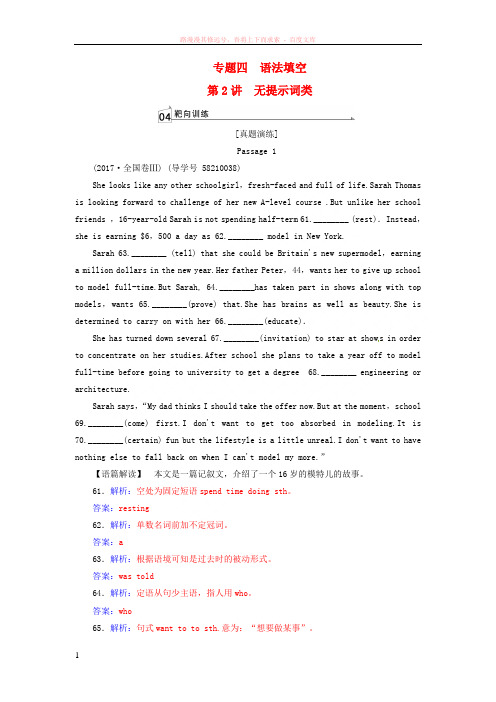
专题四语法填空第2讲无提示词类[真题演练]Passage 1(2017·全国卷Ⅲ) (导学号 58210038)She looks like any other schoolgirl,fresh-faced and full of life.Sarah Thomas is looking forward to challenge of her new A-level course .But unlike her school friends ,16-year-old Sarah is not spending half-term 61.________ (rest).Instead,she is earning $6,500 a day as 62.________ model in New York.Sarah 63.________ (tell) that she could be Britain's new supermodel,earning a million dollars in the new year.Her father Peter,44,wants her to give up school to model full-time.But Sarah, 64.________has taken part in shows along with top models,wants 65.________(prove) that.She has brains as well as beauty.She is determined to carry on with her 66.________(educate).She has turned down several 67.________(invitation) to star at show s in order to concentrate on her studies.After school she plans to take a year off to model full-time before going to university to get a degree 68.________ engineering or architecture.Sarah says,“My dad thinks I should take the offer now.But at the moment,school69.________(come) first.I don't want to get too absorbed in modeling.It is70.________(certain) fun but the lifestyle is a little unreal.I don't want to have nothing else to fall back on when I can't model my more.”【语篇解读】本文是一篇记叙文,介绍了一个16岁的模特儿的故事。
语法填空习题-高考英语二轮复习

语法填空(习题)--2022届高考英语二轮复习1.阅读下面短文, 在空白处填入1个适当的单词或括号内单词的正确形式。
A reporter from Jiangsu Province went to Australia and some other countries with his father for a 3-month trip,①_______ turned out to be a miracle(奇迹).The reporter’s father spent most of his life ②_______ (work) on the farm. The son started these ③_______ (amaze) trips with his father because the father got cancer-----a serious ④_______ (ill). The reporter wanted ⑤_______ (take) his father to travel in the hope that his father can find his younger self in his last days. They ⑥_______ (travel) more than 13,000 kilometers and took over 110,000 ⑦_______ (picture) on their trips to different countries. Well, a miracle happened during the “rebirth” trips.⑧_______ their surprise, his father got ⑨_______ (good) and became more open-hearted.He even taught himself to play⑩_______ violin, and then he played it very well after practice. After that miracle trip, now he is expecting another trip to Africa. He is the most stylish dad ever. Time carves (雕刻) the old father’s face but youth flows in his blood. This is the real style.2.阅读下面材料,在空白处填入适当的内容(1个单词)或括号内单词的正确形式。
高考英语二轮复习教案(新高考专用) 语法填空并列句及从句 Word版含解析
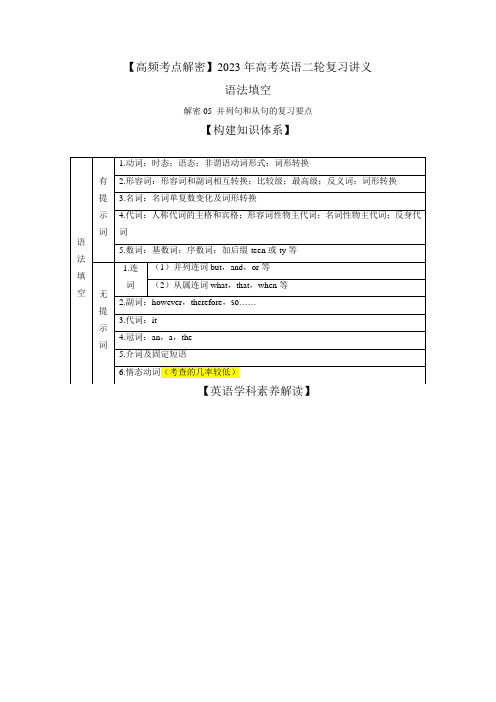
【高频考点解密】2023年高考英语二轮复习讲义语法填空解密05 并列句和从句的复习要点【构建知识体系】【解密新高考真题】——预测高考命题方向并列句和从句高考解密2023年命题解读和近三年考点分布_______ live within the Giant Panda Range and significantly improve the health of the ecosystem in the area.【答案】that【解析】考查定语从句关系词。
句意:该计划旨在为生活在Giant Panda Range的所有物种提供更有力的保护,并显著改善该地区的生态系统健康。
设空处为关系词引导限制性定语从句,先行词等于关系词,设空处在从句中作指物的主语,先行词为species,且先行词前为all修饰,只能用关系代词that。
故填that。
2.(2022·全国甲卷)On the 1,100. Kilometer journey, the man Cao Shengkang, _____ lost his eyesight at the age of eight in a car accident, crossed 40 cities and counties in three province.【答案】who【解析】考查定语从句。
句意:在1100公里的旅程中,8岁时因一次车祸失明的男子曹盛康穿过了三个省的40个城市和县。
分析句子结合句意可知,此处是非限定性定语从句,先行词为Cao Shengkang,指人,在从句中作主语,应用关系代词who引导。
故填who。
3.(2022·浙江1月)Kim Cobb, a professor at the Georgia Institute of Technology in Atlanta, is one of a small but growing minority of academics _____ are cutting back on their air travel because of climate change.【答案】that/who【解析】考查定语从句。
2018年高考英语母题题源系列16 语法填空(记叙文)

2018年高考英语母题题源系列16 语法填空(记叙文)SYS201806020701一、语法填空详细信息1. 难度:中等[2017·湖南省邵阳市高三大联考]My English teacher was very tall. The moment she 1.________ (enter) the class, we would all sit 2.________ (quiet) and open the books. She would encourage me by giving me important assignments and also morning news to read during the assembly. She would come down and listen to my English debate (辩论), 3.________ made me take part in all debate competitions.4.________ same was true of my biology and science teacher. She was very nice and sweet. She would always give me extra information on the biology project. I could not go to the lab for experiments, so she would bring the lab down and help me with the biology and science5.________ (experiment) and would give me excellent marks.My friends made me monitor and the naughty boys listened to me. My friends used to help me with my notes when I was 6.________ (absence).My teachers always gave me important project work and I felt proud when they patted me 7.________ the back after I finishedit quickly and correctly. I was never shouted at or made fun of or scolded by any of my friends and teachers.Today I often see the terrible punishments 8.________ (give) to students on TVs.I feel very sad.I really want to express my love and thanks to all my wonderful teachers and friends. Without them my school life would not9.________ (be) so excellent and 10.________ (forget).SYS20180602070详细信息2. 难度:中等.【2017吉林实验中学二模】阅读下面材料,在空白处填入适当的内容(1个单词)或括号内单词的正确形式。
高三英语二轮精品卷语法填空和完形填空_4
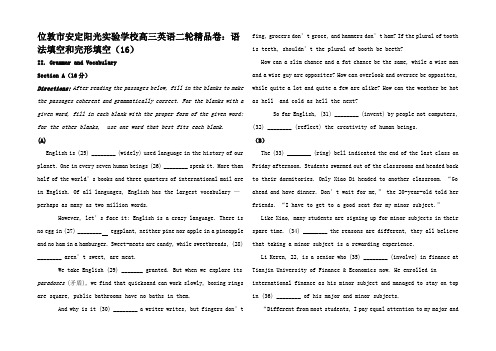
位敦市安定阳光实验学校高三英语二轮精品卷:语法填空和完形填空(16)II. Grammar and VocabularySection A(16分)Directions:After reading the passages below, fill in the blanks to make the passages coherent and grammatically correct. For the blanks with a given word, fill in each blank with the proper form of the given word; for the other blanks, use one word that best fits each blank.(A)English is (25) ________ (widely) used language in the history of our planet. One in every seven human beings (26) ________ speak it. More than half o f the world’s books and three quarters of international mail are in English. Of all languages, English has the largest vocabulary —perhaps as many as two million words.However, let’s face it: English is a crazy language. There is no egg in (27) ________ eggplant, neither pine nor apple in a pineapple and no ham in a hamburger. Sweet-meats are candy, while sweetbreads, (28) ________ aren’t sweet, are meat.We take English (29) _______ granted. But when we explore its paradoxes (矛盾), we find that quicksand can work slowly, boxing rings are square, public bathrooms have no baths in them.And why is it (30) ________ a writer writes, but fingers don’t fing, grocers don’t groce, and hammers don’t ham? If the plural of tooth is t eeth, shouldn’t the plural of booth be beeth?How can a slim chance and a fat chance be the same, while a wise man and a wise guy are opposites? How can overlook and oversee be opposites, while quite a lot and quite a few are alike? How can the weather be hot as hell and cold as hell the next?So far English, (31) ________ (invent) by people not computers, (32) ________ (reflect) the creativity of human beings.(B)The (33) ________ (ring) bell indicated the end of the last class on Friday afternoon. Students swarmed out of the classrooms and headed back to their dormitories. Only Xiao Di headed to another classroom. “Go ahead and have dinner. Don’t wait for me,” the 20-year-old told her friends. “I have to get to a good seat for my minor subject.”Like Xiao, many students are signing up for minor subjects in their spare time. (34) ________ the reasons are different, they all believe that taking a minor subject is a rewarding experience.Li Keren, 22, is a senior who (35) ________ (involve) in finance at Tianjin University of Finance & Economics now. He enrolled in international finance as his minor subject and managed to stay on top in (36) ________ of his major and minor subjects.“Different from most students, I pay equal attention to my major andminor subject,” he says. He thinks that students have signed up for minor subjects (37) ________ they have the energy and time to do so. The disadvantage of (38) ________ (pay) less attention to a minor subject,according to Li, is (39) ________ students may not get a comprehensive understanding of the subject.Therefore, what students should do is (40) ________ (devote) the same energy and time to their major subject as before, while sacrificing their spare time to work on their minor subject. “Consideri ng your future, it’s a worthwhile effort,” he says. Section B (10分)Directions: Complete the following passage by using the words in the box. Each word can only be used once. Note that there is one word more than you need.When asked about one interview candidate who impressed her most, Christine, an HR manager at an investment company cited an example of a(n) 41 who had prepared well. “He seemed very prepared to work for our company during the interview. He 42 good research on the company’s core business and also the industry in general,” she said.This suggests that HR managers expect candidates to do their homework43 , but how? Here are some tips to 44 your chances of getting a job.Search the Web and research the 45 of the company and the peoplewho you think are going to be interviewing you. Learn exactly what it is that they do and how you would fit in with the company. Most importantly,try to understand the “culture” of the company, which is to say its underlying 46 ; the HR departments often state missions and give 47 statements. You need to communicate in a way that 48 their company standards; this will show that you can fit in that organization. Understand a little of what their 49 are doing. This will show thatyou’ve bothered to find out where their position in the market is. Just as important is your own personal preparation. Think about the key things you want to communicate and why you would be ideal for the job. Think about how you can sound 50 without sounding desperate -- how you can sell yourself.Generally, wear a suit (and also a tie for guys), but the dress codedepends on the job you are going for. When you study the company culture, check what is expected in this area also. III. Reading Comprehension Section A (15分)Directions: For each blank in the following passage there are four words or phrases marked A, B, C and D. Fill in each blank with the word or phrasethat best fits the context.Kodak’s decision to file for bankruptcy(破产)protection is a sad, though not unexpected, turning point for a leading American corporation that 51 consumer photography and dominated the film market for decades, but finally failed to adapt to the digital revolution.Although many people owe Kodak’s downfall to “complacency (自满)”, that 52 turns to a blind eye to the long time which the company spent in reinventing itself. Decades ago, Kodak foresaw that digital photography would unavoidably 53 film —and in fact, Kodak invented the first digital camera in 1975 —but in a 54 decision, the company chose to 55 its new discovery and went on focusing on its traditional film business.It wasn’t that Kodak was 56 to the future, but rather that it failed to carry out a strategy to face it, said Rebecca Henderson, a professor at Harvard Business School. By the time the company realized its 57 , it was too late.Kodak is an example of a firm that was very much aware that they had to adapt, and spent a lot of money trying to do so, but 58 failed. Large companies have a difficult time 59into new markets because they always attempt to put existing assets(资产) into the new businesses.Although Kodak predicted the 60 rise of digital photography, its corporate(企业的) culture was too 61 the successes of the past. Therefore, it is impossible for them to make the clean break, which is necessary to fully embrace the future. They were a company stuck in time. Their history was so important to them. Now their history has become a burden.Kodak’s downfall over the last several decades was 62 . In 1976, its products 6390% of the market for photographic film and 85% of the market for cameras. But the 1980s brought new 64 from Japanese film company Fuji Photo, which defeated Kodak by offering lower prices for film and photo supplies. Kodak’s 65 not to pursue the role of official film for the 1984 Los Angeles Olympics was a major miscalculation. The golden chance went to Fuji instead, which exploited its sponsorship to win a permanent foothold in the marketplace.51. A. prepared B. preferred C. pioneered D. promised52. A. result B. explanation C. purpose D. measure53. A. charge B. overcome C. replace D. resist54. A. fruitful B. fateful C. useful D. hopeful55. A. share B. show C. shift D. shelf56. A. sensitive B. blind C. accessible D.resistant57. A. mistake B. decision C. fear D. concept58. A. eventually B. necessarily C. flexibly D. naturally59. A. switching B. looking C. falling D. plunging60. A. critical B. reasonable C. inevitable D. essential61. A. related to B. concerned about C. involved in D. trapped in62. A. common B. average C. regular D. dramatic63. A. decided on B. contributed to C. accounted for D. benefited from64. A. chance B. competition C. hope D. means65. A. decision B. effort C. regret D. accessII. Grammar and VocabularySection A: Grammar(A)25. the most widely 26. can 27. an 28. which29.for 30. that 31. invented 32. has reflected/has been reflecting(B)33. ringing 34. Though 35. is involved 36. both 37. because 38. paying 39. that 40. to devote Section B: Vocabulary41. F 42. J. 43. C 44. D 45. H 46. B 47. K 48. G 49. A 50. EIII. Reading ComprehensionSection A51—55 CBCBD 56—60 BAAAC 61—65 DDCBA。
- 1、下载文档前请自行甄别文档内容的完整性,平台不提供额外的编辑、内容补充、找答案等附加服务。
- 2、"仅部分预览"的文档,不可在线预览部分如存在完整性等问题,可反馈申请退款(可完整预览的文档不适用该条件!)。
- 3、如文档侵犯您的权益,请联系客服反馈,我们会尽快为您处理(人工客服工作时间:9:00-18:30)。
试做真题
透析真题
高手必备
萃取高招
对点精练
Fat and salt are very important parts of a diet. They are required __63_________ to process (process) the food that we eat, to recover from injury are removed and for several other bodily functions. When fat and salt __64_______ (remove) from food, the food tastes as if it is missing something. As __65_________ result, people will eat more food to try to make up for a worse that something missing. Even __66__________ (bad), the amount of fast food that people eat goes up. Fast food __67__________ (be) full is of fat and salt;by __68___________ eating (eat) more fast food people will get more salt and fat than they need in their diet. Having enough fat and salt in your meals will reduce the urge to snack (吃点心) between meals and will improve the taste of your food. However, be __69__________ (care) not to go to extremes. Like careful anything, it is possible to have too much of both, __70___________ is which not good for the health.
试做真题
透析真题
高手必备
萃取高招
对点精练
Passage 2 (2017· 全国卷Ⅱ) In 1863 the first underground passenger railway in the world opened in London. It ran for just under seven kilometers and allowed crowds (crowd) on the roads above as people to avoid terrible __61__________ they travelled to and __62_________ work. It took three years to from complete and was built using an interesting method. This included laying (lay) the track and then building digging up the road, __63__________ a strong roof over __64____________ top. When all those had been the done, the road surface was replaced.
试做真题
透析真题
高手必备
萃取高招
对点精练
68.解析:eating 考查非谓语动词。介词 by 后跟名词、代词 或动名词作宾语,故填 eating。 69.解析:careful 考查形容词。此处为形容词作表语,故填 careful“当心的”构成系表结构。 70.解析:which 考查关系代词。分析句子结构可知,此处 为非限制性定语从句,空处指代前句的内容,且在从句中作主语, 故填关系代词 which。
试做真题
透析真题
高手必备
萃取高招
对点精练
64.解析:are removed 考查时态和语态。本文的主体时态为一 般现在时,此处亦应用一般现在时;又因 fat and salt 是动词 remove 的承受者,应用被动语态。所以此处填 are removed。 65. 解析: a 考查冠词。 as a result 为固定搭配, 意为“结果”。 66.解析:worse 考查比较级。短语 Even worse 意为“更糟 糕的是”,表示意义的递进。故用 worse。 67.解析:is 考查时态和主谓一致。此处是对客观情况的描 述,应用一般现在时;分析句子结构可知,该句缺少谓语动词,又 因主语为 Fast food,故填 is。
专题十六 语法填空
[全国卷3年考情分析] 注:2017、2016年全国高考共3套试题,有的按甲、乙、丙卷分类, 有的按Ⅰ、Ⅱ、Ⅲ卷分类,其对应关系为Ⅰ卷—乙卷,Ⅱ卷—甲卷、 Ⅲ卷—丙卷,本书按Ⅰ、Ⅱ、Ⅲ卷分类,以下各题型同。
试做真题
透析真题
高手必备
萃取高招
Hale Waihona Puke 对点精练Passage 1 (2017· 全国卷Ⅰ) There has been a recent trend in the food service industry toward lower fat content and less salt. This trend, which was started by the medical community (医学界) __61__ a method of fighting heart disease, has had some unintended side __62__ (effect) such as overweight and heart disease—the very thing the medical community was trying to fight.
试做真题
透析真题
高手必备
萃取高招
对点精练
【文章大意】 本文是一篇说明文,主要讲述了一种低脂肪、 低盐的饮食趋势及其对人们健康的影响。 61.解析:as 考查介词。分析句子结构可知,此处在句中作 状语,表示“作为一种抵御心脏病的方式”,所以填 as,意为“作 为”。 62.解析:effects 考查名词复数。这种趋势产生了一些意想 不到的副作用。根据空前的“some”及空后的“such as overweight and heart disease”可知,此处指不止一种副作用,故用名词复数形 式 effects。 63.解析:to process 考查非谓语动词。be required to do sth. 为固定用法。
